Supporting Innovation: Research Skills & Methodologies in Healthcare
VerifiedAdded on 2023/01/05
|9
|3085
|72
Report
AI Summary
This report explores the critical research skills and methodologies essential for supporting innovation in health and social care, focusing on evidence-based approaches. It discusses the importance of research skills like critical thinking, problem-solving, communication, and time management in enhancing the effectiveness of healthcare interventions. Various methodologies such as consensus development conferences, Delphi technique, nominal group technique, RAND method, meta-analysis, systematic reviews, and randomized control trials are examined for their application in gathering precise data and improving clinical practices. The report highlights how these skills and methodologies contribute to service improvements by addressing clinical questions, analyzing interventions, and implementing evidence-based practices. Furthermore, it emphasizes the vital role of critical thinking skills in evaluating information sources and driving innovation within the healthcare sector, ultimately leading to better patient outcomes and enhanced service delivery. This student contributed the assignment, and Desklib offers a range of study tools.
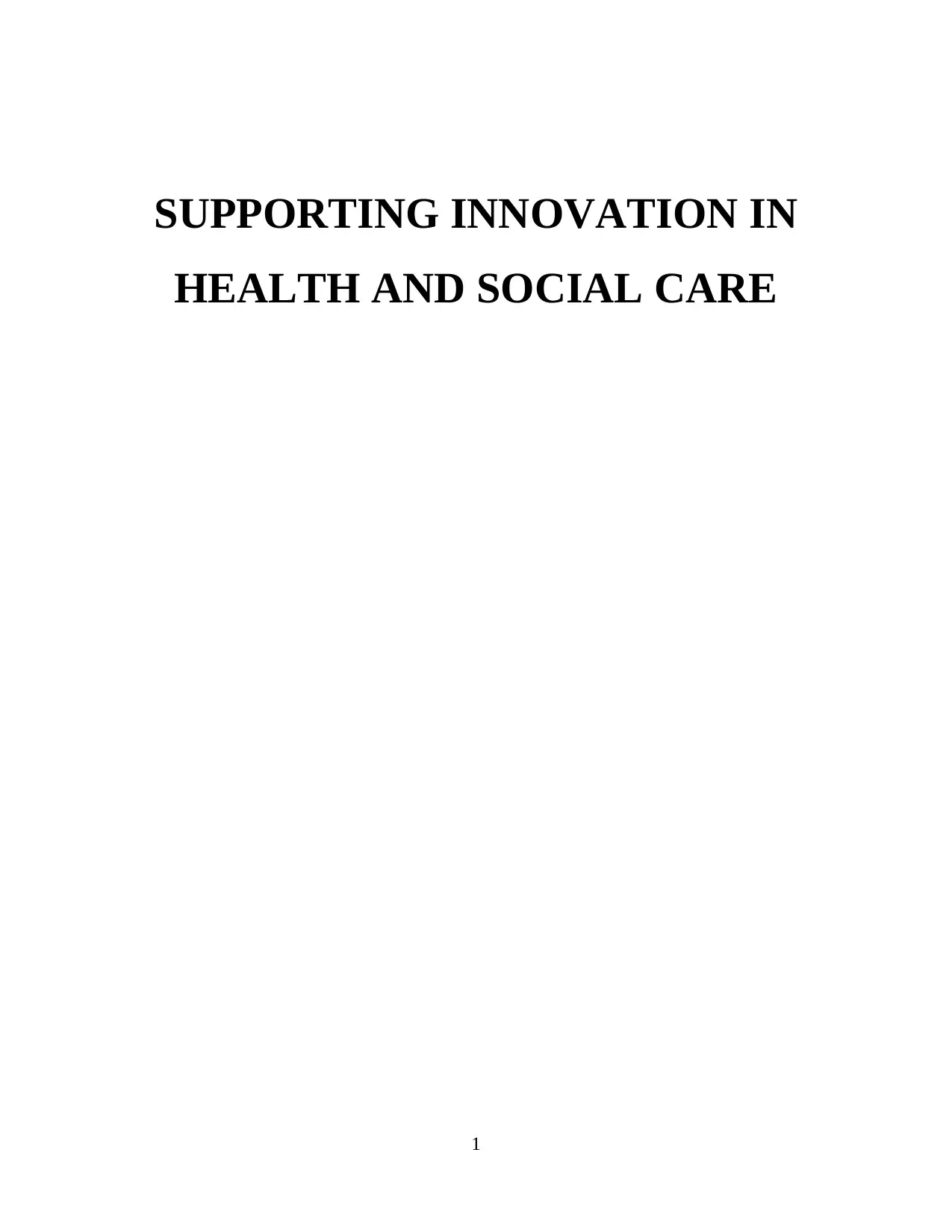
SUPPORTING INNOVATION IN
HEALTH AND SOCIAL CARE
1
HEALTH AND SOCIAL CARE
1
Paraphrase This Document
Need a fresh take? Get an instant paraphrase of this document with our AI Paraphraser
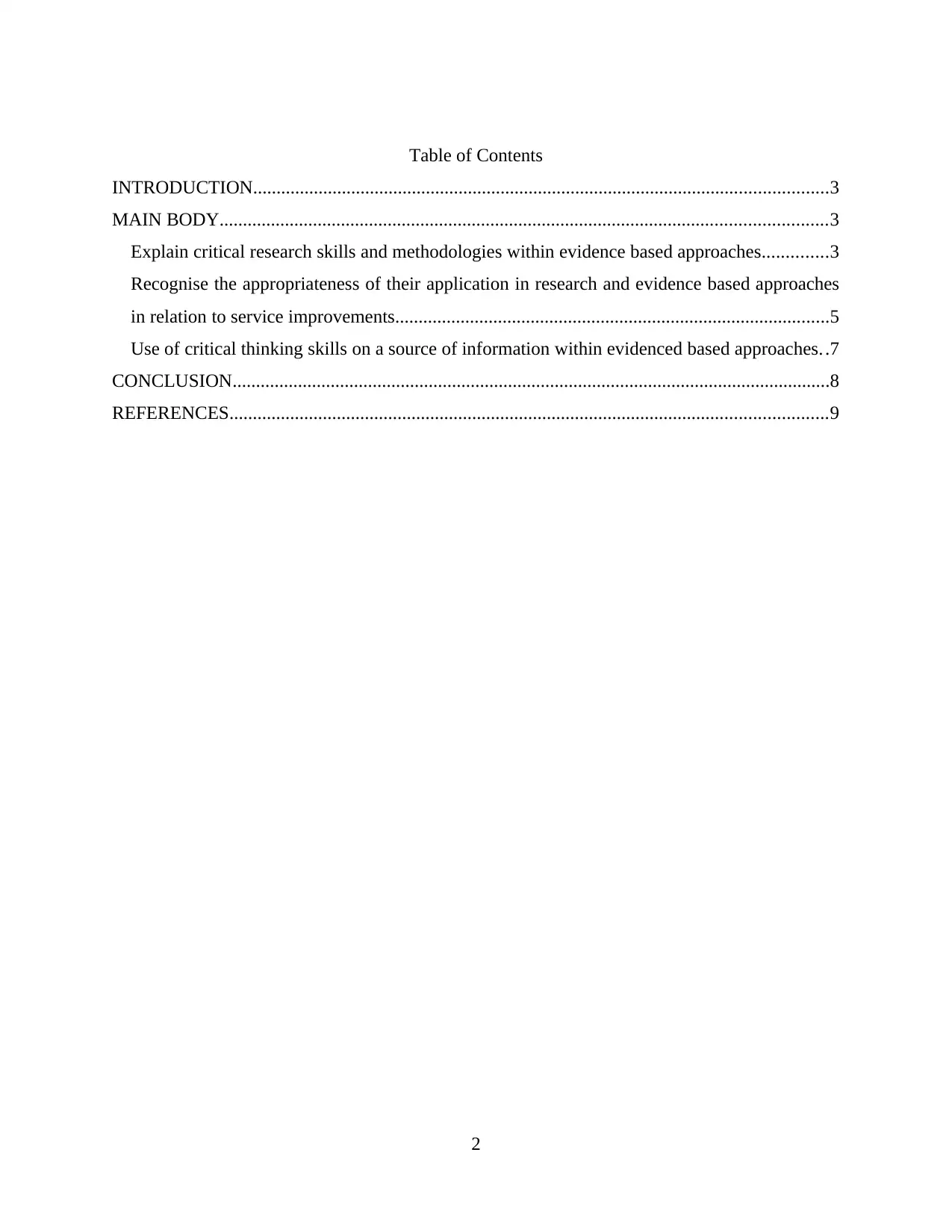
Table of Contents
INTRODUCTION...........................................................................................................................3
MAIN BODY..................................................................................................................................3
Explain critical research skills and methodologies within evidence based approaches..............3
Recognise the appropriateness of their application in research and evidence based approaches
in relation to service improvements.............................................................................................5
Use of critical thinking skills on a source of information within evidenced based approaches. .7
CONCLUSION................................................................................................................................8
REFERENCES................................................................................................................................9
2
INTRODUCTION...........................................................................................................................3
MAIN BODY..................................................................................................................................3
Explain critical research skills and methodologies within evidence based approaches..............3
Recognise the appropriateness of their application in research and evidence based approaches
in relation to service improvements.............................................................................................5
Use of critical thinking skills on a source of information within evidenced based approaches. .7
CONCLUSION................................................................................................................................8
REFERENCES................................................................................................................................9
2
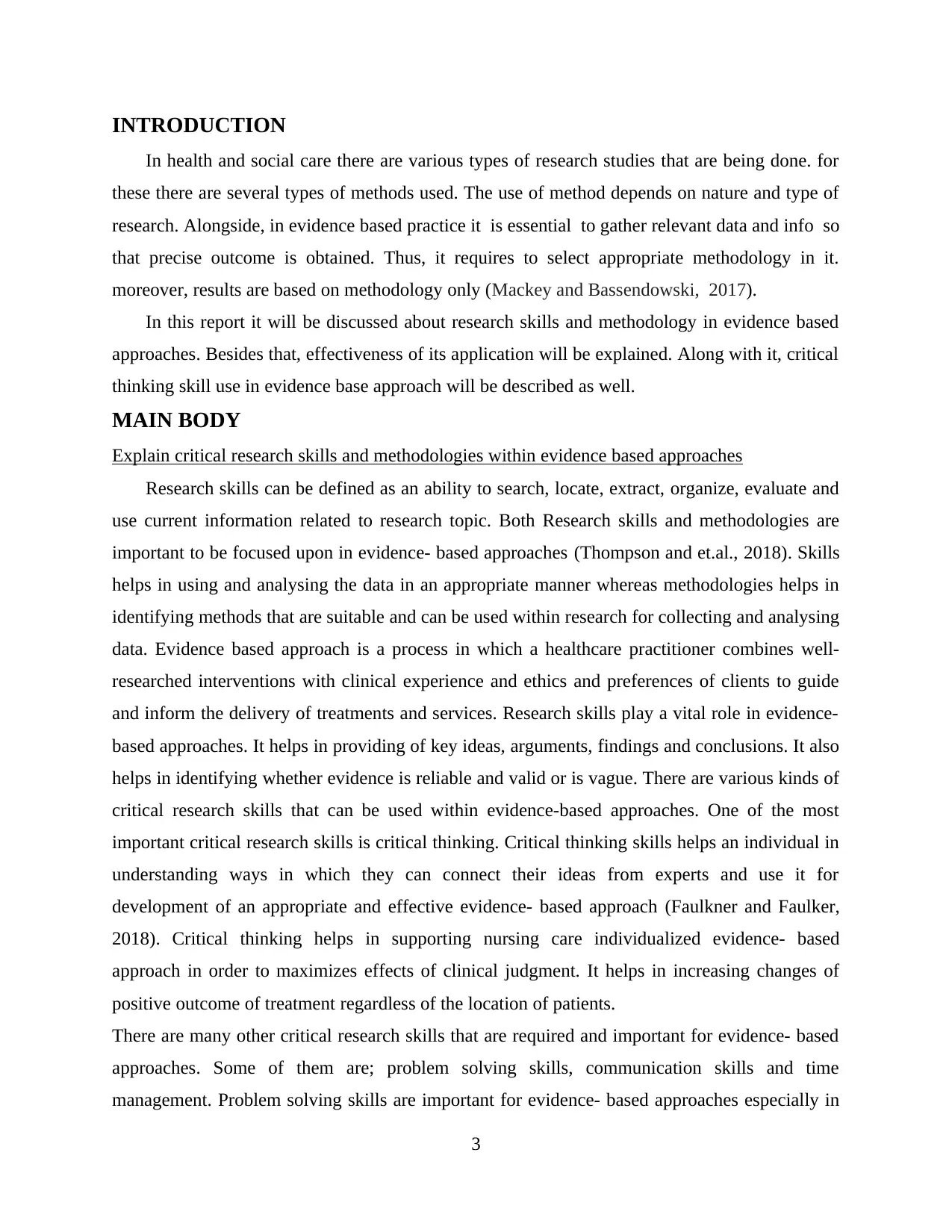
INTRODUCTION
In health and social care there are various types of research studies that are being done. for
these there are several types of methods used. The use of method depends on nature and type of
research. Alongside, in evidence based practice it is essential to gather relevant data and info so
that precise outcome is obtained. Thus, it requires to select appropriate methodology in it.
moreover, results are based on methodology only (Mackey and Bassendowski, 2017).
In this report it will be discussed about research skills and methodology in evidence based
approaches. Besides that, effectiveness of its application will be explained. Along with it, critical
thinking skill use in evidence base approach will be described as well.
MAIN BODY
Explain critical research skills and methodologies within evidence based approaches
Research skills can be defined as an ability to search, locate, extract, organize, evaluate and
use current information related to research topic. Both Research skills and methodologies are
important to be focused upon in evidence- based approaches (Thompson and et.al., 2018). Skills
helps in using and analysing the data in an appropriate manner whereas methodologies helps in
identifying methods that are suitable and can be used within research for collecting and analysing
data. Evidence based approach is a process in which a healthcare practitioner combines well-
researched interventions with clinical experience and ethics and preferences of clients to guide
and inform the delivery of treatments and services. Research skills play a vital role in evidence-
based approaches. It helps in providing of key ideas, arguments, findings and conclusions. It also
helps in identifying whether evidence is reliable and valid or is vague. There are various kinds of
critical research skills that can be used within evidence-based approaches. One of the most
important critical research skills is critical thinking. Critical thinking skills helps an individual in
understanding ways in which they can connect their ideas from experts and use it for
development of an appropriate and effective evidence- based approach (Faulkner and Faulker,
2018). Critical thinking helps in supporting nursing care individualized evidence- based
approach in order to maximizes effects of clinical judgment. It helps in increasing changes of
positive outcome of treatment regardless of the location of patients.
There are many other critical research skills that are required and important for evidence- based
approaches. Some of them are; problem solving skills, communication skills and time
management. Problem solving skills are important for evidence- based approaches especially in
3
In health and social care there are various types of research studies that are being done. for
these there are several types of methods used. The use of method depends on nature and type of
research. Alongside, in evidence based practice it is essential to gather relevant data and info so
that precise outcome is obtained. Thus, it requires to select appropriate methodology in it.
moreover, results are based on methodology only (Mackey and Bassendowski, 2017).
In this report it will be discussed about research skills and methodology in evidence based
approaches. Besides that, effectiveness of its application will be explained. Along with it, critical
thinking skill use in evidence base approach will be described as well.
MAIN BODY
Explain critical research skills and methodologies within evidence based approaches
Research skills can be defined as an ability to search, locate, extract, organize, evaluate and
use current information related to research topic. Both Research skills and methodologies are
important to be focused upon in evidence- based approaches (Thompson and et.al., 2018). Skills
helps in using and analysing the data in an appropriate manner whereas methodologies helps in
identifying methods that are suitable and can be used within research for collecting and analysing
data. Evidence based approach is a process in which a healthcare practitioner combines well-
researched interventions with clinical experience and ethics and preferences of clients to guide
and inform the delivery of treatments and services. Research skills play a vital role in evidence-
based approaches. It helps in providing of key ideas, arguments, findings and conclusions. It also
helps in identifying whether evidence is reliable and valid or is vague. There are various kinds of
critical research skills that can be used within evidence-based approaches. One of the most
important critical research skills is critical thinking. Critical thinking skills helps an individual in
understanding ways in which they can connect their ideas from experts and use it for
development of an appropriate and effective evidence- based approach (Faulkner and Faulker,
2018). Critical thinking helps in supporting nursing care individualized evidence- based
approach in order to maximizes effects of clinical judgment. It helps in increasing changes of
positive outcome of treatment regardless of the location of patients.
There are many other critical research skills that are required and important for evidence- based
approaches. Some of them are; problem solving skills, communication skills and time
management. Problem solving skills are important for evidence- based approaches especially in
3
⊘ This is a preview!⊘
Do you want full access?
Subscribe today to unlock all pages.

Trusted by 1+ million students worldwide
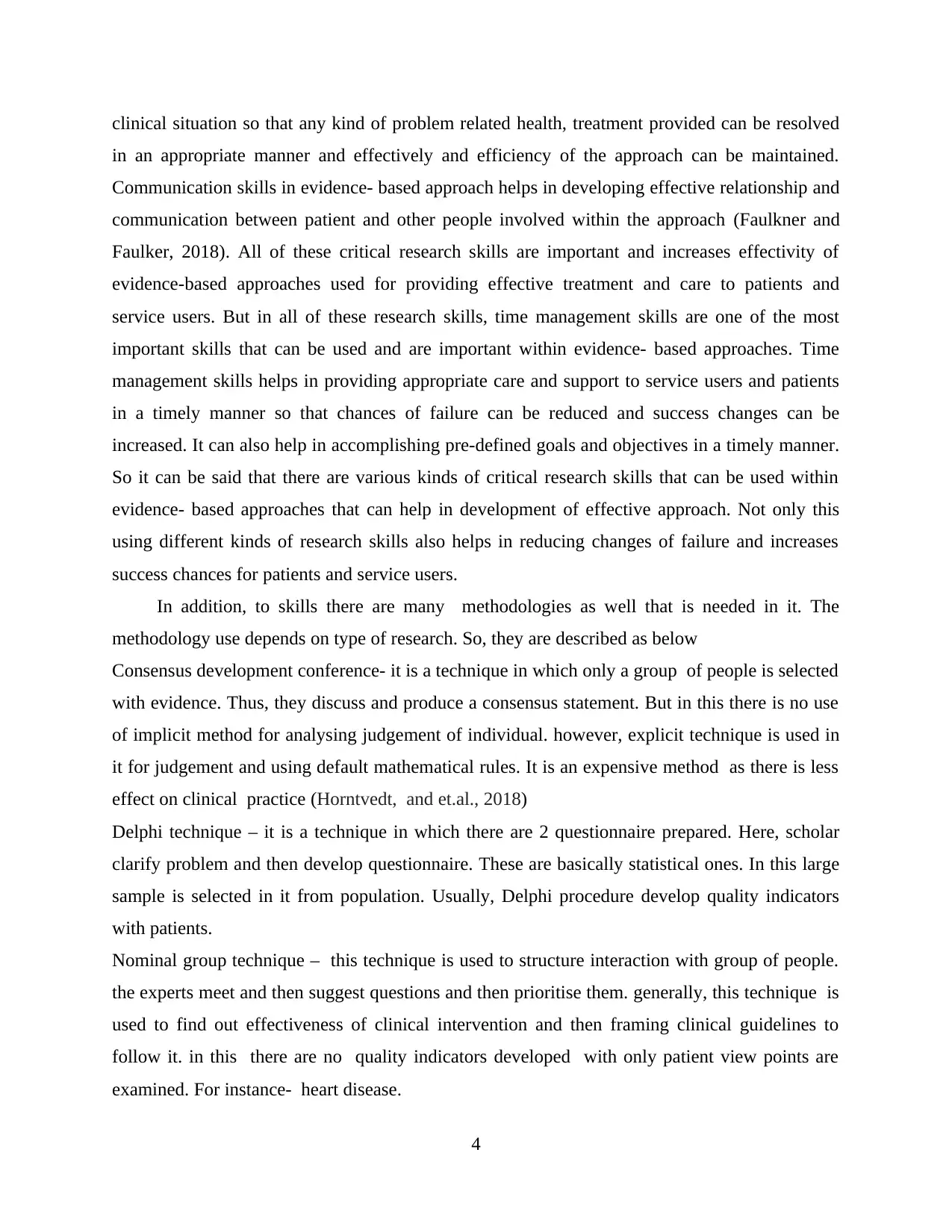
clinical situation so that any kind of problem related health, treatment provided can be resolved
in an appropriate manner and effectively and efficiency of the approach can be maintained.
Communication skills in evidence- based approach helps in developing effective relationship and
communication between patient and other people involved within the approach (Faulkner and
Faulker, 2018). All of these critical research skills are important and increases effectivity of
evidence-based approaches used for providing effective treatment and care to patients and
service users. But in all of these research skills, time management skills are one of the most
important skills that can be used and are important within evidence- based approaches. Time
management skills helps in providing appropriate care and support to service users and patients
in a timely manner so that chances of failure can be reduced and success changes can be
increased. It can also help in accomplishing pre-defined goals and objectives in a timely manner.
So it can be said that there are various kinds of critical research skills that can be used within
evidence- based approaches that can help in development of effective approach. Not only this
using different kinds of research skills also helps in reducing changes of failure and increases
success chances for patients and service users.
In addition, to skills there are many methodologies as well that is needed in it. The
methodology use depends on type of research. So, they are described as below
Consensus development conference- it is a technique in which only a group of people is selected
with evidence. Thus, they discuss and produce a consensus statement. But in this there is no use
of implicit method for analysing judgement of individual. however, explicit technique is used in
it for judgement and using default mathematical rules. It is an expensive method as there is less
effect on clinical practice (Horntvedt, and et.al., 2018)
Delphi technique – it is a technique in which there are 2 questionnaire prepared. Here, scholar
clarify problem and then develop questionnaire. These are basically statistical ones. In this large
sample is selected in it from population. Usually, Delphi procedure develop quality indicators
with patients.
Nominal group technique – this technique is used to structure interaction with group of people.
the experts meet and then suggest questions and then prioritise them. generally, this technique is
used to find out effectiveness of clinical intervention and then framing clinical guidelines to
follow it. in this there are no quality indicators developed with only patient view points are
examined. For instance- heart disease.
4
in an appropriate manner and effectively and efficiency of the approach can be maintained.
Communication skills in evidence- based approach helps in developing effective relationship and
communication between patient and other people involved within the approach (Faulkner and
Faulker, 2018). All of these critical research skills are important and increases effectivity of
evidence-based approaches used for providing effective treatment and care to patients and
service users. But in all of these research skills, time management skills are one of the most
important skills that can be used and are important within evidence- based approaches. Time
management skills helps in providing appropriate care and support to service users and patients
in a timely manner so that chances of failure can be reduced and success changes can be
increased. It can also help in accomplishing pre-defined goals and objectives in a timely manner.
So it can be said that there are various kinds of critical research skills that can be used within
evidence- based approaches that can help in development of effective approach. Not only this
using different kinds of research skills also helps in reducing changes of failure and increases
success chances for patients and service users.
In addition, to skills there are many methodologies as well that is needed in it. The
methodology use depends on type of research. So, they are described as below
Consensus development conference- it is a technique in which only a group of people is selected
with evidence. Thus, they discuss and produce a consensus statement. But in this there is no use
of implicit method for analysing judgement of individual. however, explicit technique is used in
it for judgement and using default mathematical rules. It is an expensive method as there is less
effect on clinical practice (Horntvedt, and et.al., 2018)
Delphi technique – it is a technique in which there are 2 questionnaire prepared. Here, scholar
clarify problem and then develop questionnaire. These are basically statistical ones. In this large
sample is selected in it from population. Usually, Delphi procedure develop quality indicators
with patients.
Nominal group technique – this technique is used to structure interaction with group of people.
the experts meet and then suggest questions and then prioritise them. generally, this technique is
used to find out effectiveness of clinical intervention and then framing clinical guidelines to
follow it. in this there are no quality indicators developed with only patient view points are
examined. For instance- heart disease.
4
Paraphrase This Document
Need a fresh take? Get an instant paraphrase of this document with our AI Paraphraser
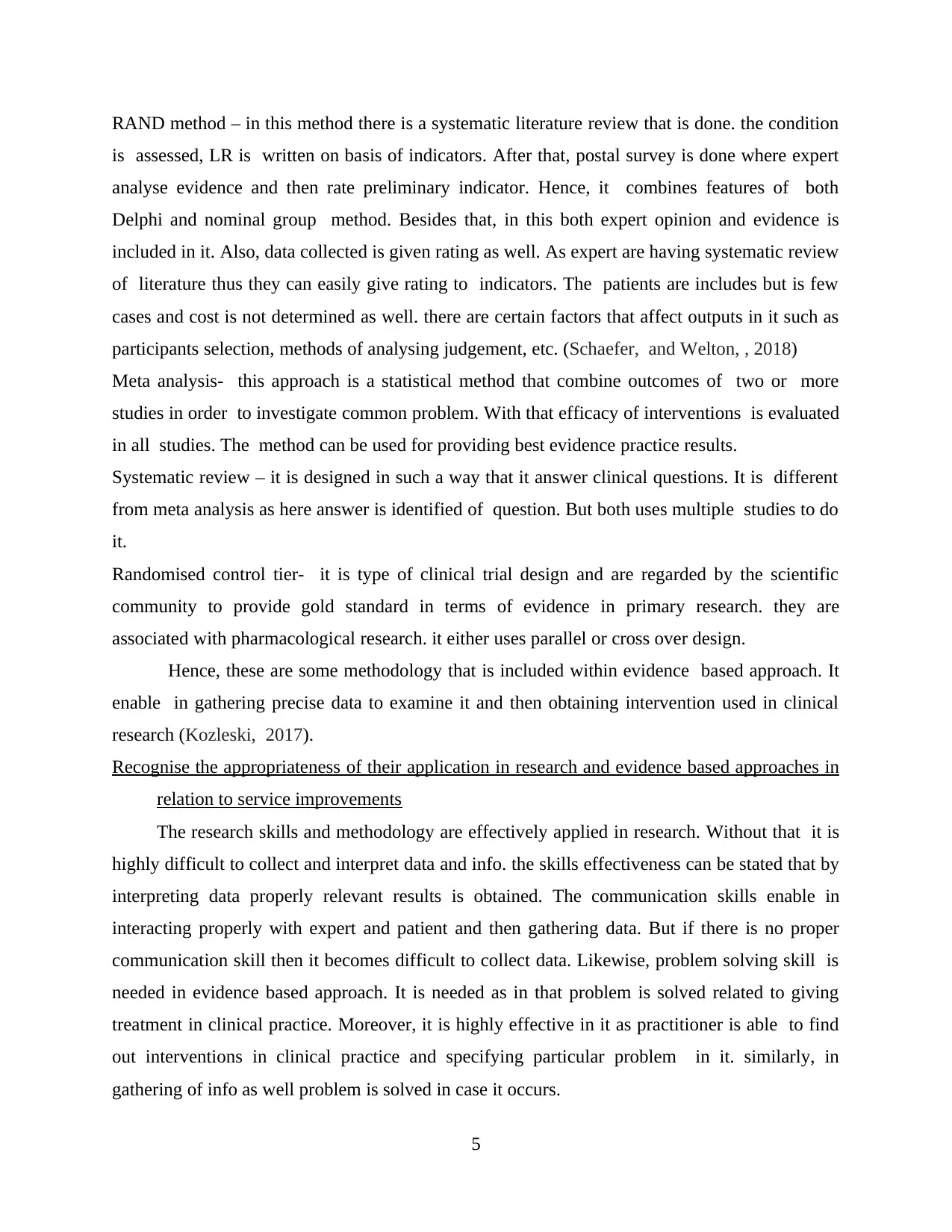
RAND method – in this method there is a systematic literature review that is done. the condition
is assessed, LR is written on basis of indicators. After that, postal survey is done where expert
analyse evidence and then rate preliminary indicator. Hence, it combines features of both
Delphi and nominal group method. Besides that, in this both expert opinion and evidence is
included in it. Also, data collected is given rating as well. As expert are having systematic review
of literature thus they can easily give rating to indicators. The patients are includes but is few
cases and cost is not determined as well. there are certain factors that affect outputs in it such as
participants selection, methods of analysing judgement, etc. (Schaefer, and Welton, , 2018)
Meta analysis- this approach is a statistical method that combine outcomes of two or more
studies in order to investigate common problem. With that efficacy of interventions is evaluated
in all studies. The method can be used for providing best evidence practice results.
Systematic review – it is designed in such a way that it answer clinical questions. It is different
from meta analysis as here answer is identified of question. But both uses multiple studies to do
it.
Randomised control tier- it is type of clinical trial design and are regarded by the scientific
community to provide gold standard in terms of evidence in primary research. they are
associated with pharmacological research. it either uses parallel or cross over design.
Hence, these are some methodology that is included within evidence based approach. It
enable in gathering precise data to examine it and then obtaining intervention used in clinical
research (Kozleski, 2017).
Recognise the appropriateness of their application in research and evidence based approaches in
relation to service improvements
The research skills and methodology are effectively applied in research. Without that it is
highly difficult to collect and interpret data and info. the skills effectiveness can be stated that by
interpreting data properly relevant results is obtained. The communication skills enable in
interacting properly with expert and patient and then gathering data. But if there is no proper
communication skill then it becomes difficult to collect data. Likewise, problem solving skill is
needed in evidence based approach. It is needed as in that problem is solved related to giving
treatment in clinical practice. Moreover, it is highly effective in it as practitioner is able to find
out interventions in clinical practice and specifying particular problem in it. similarly, in
gathering of info as well problem is solved in case it occurs.
5
is assessed, LR is written on basis of indicators. After that, postal survey is done where expert
analyse evidence and then rate preliminary indicator. Hence, it combines features of both
Delphi and nominal group method. Besides that, in this both expert opinion and evidence is
included in it. Also, data collected is given rating as well. As expert are having systematic review
of literature thus they can easily give rating to indicators. The patients are includes but is few
cases and cost is not determined as well. there are certain factors that affect outputs in it such as
participants selection, methods of analysing judgement, etc. (Schaefer, and Welton, , 2018)
Meta analysis- this approach is a statistical method that combine outcomes of two or more
studies in order to investigate common problem. With that efficacy of interventions is evaluated
in all studies. The method can be used for providing best evidence practice results.
Systematic review – it is designed in such a way that it answer clinical questions. It is different
from meta analysis as here answer is identified of question. But both uses multiple studies to do
it.
Randomised control tier- it is type of clinical trial design and are regarded by the scientific
community to provide gold standard in terms of evidence in primary research. they are
associated with pharmacological research. it either uses parallel or cross over design.
Hence, these are some methodology that is included within evidence based approach. It
enable in gathering precise data to examine it and then obtaining intervention used in clinical
research (Kozleski, 2017).
Recognise the appropriateness of their application in research and evidence based approaches in
relation to service improvements
The research skills and methodology are effectively applied in research. Without that it is
highly difficult to collect and interpret data and info. the skills effectiveness can be stated that by
interpreting data properly relevant results is obtained. The communication skills enable in
interacting properly with expert and patient and then gathering data. But if there is no proper
communication skill then it becomes difficult to collect data. Likewise, problem solving skill is
needed in evidence based approach. It is needed as in that problem is solved related to giving
treatment in clinical practice. Moreover, it is highly effective in it as practitioner is able to find
out interventions in clinical practice and specifying particular problem in it. similarly, in
gathering of info as well problem is solved in case it occurs.
5
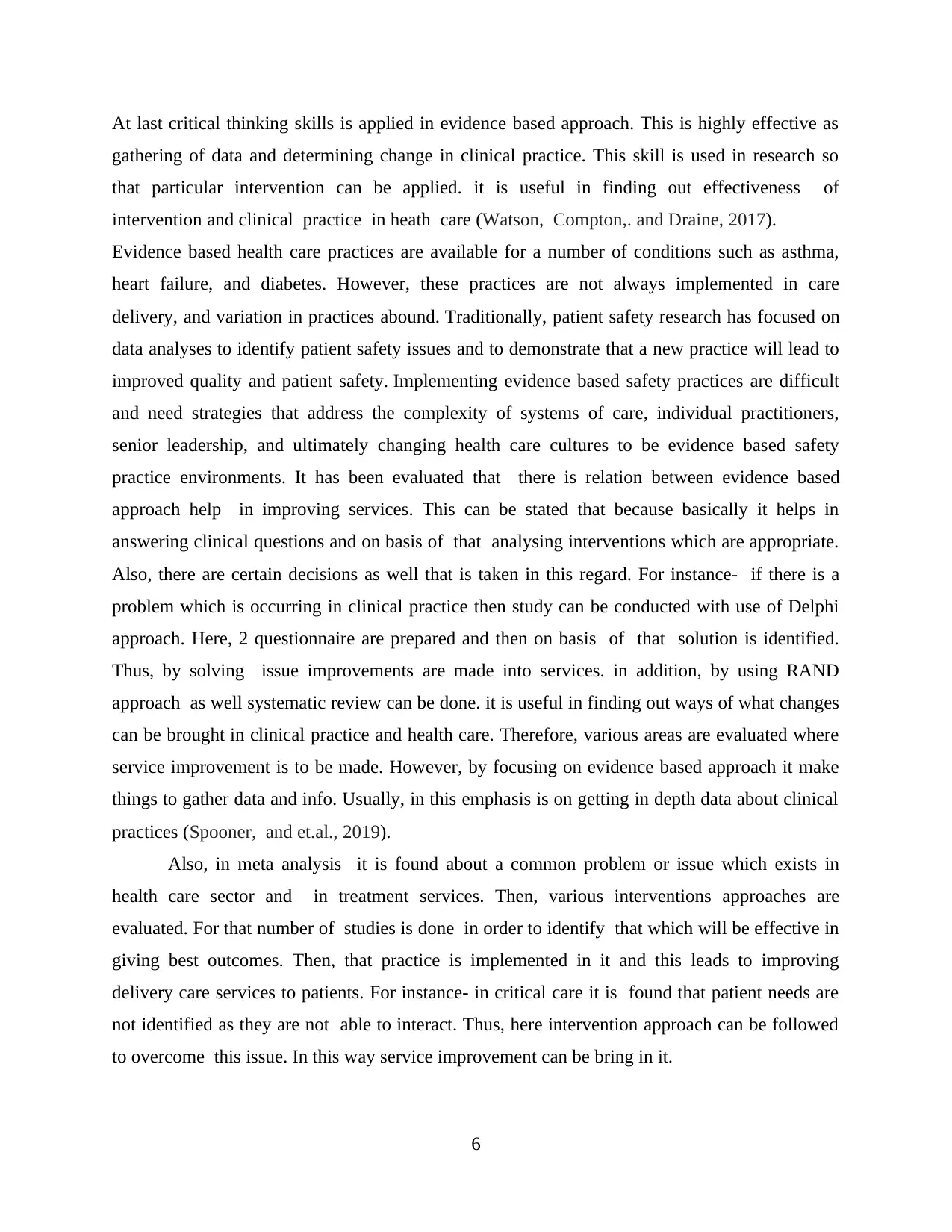
At last critical thinking skills is applied in evidence based approach. This is highly effective as
gathering of data and determining change in clinical practice. This skill is used in research so
that particular intervention can be applied. it is useful in finding out effectiveness of
intervention and clinical practice in heath care (Watson, Compton,. and Draine, 2017).
Evidence based health care practices are available for a number of conditions such as asthma,
heart failure, and diabetes. However, these practices are not always implemented in care
delivery, and variation in practices abound. Traditionally, patient safety research has focused on
data analyses to identify patient safety issues and to demonstrate that a new practice will lead to
improved quality and patient safety. Implementing evidence based safety practices are difficult
and need strategies that address the complexity of systems of care, individual practitioners,
senior leadership, and ultimately changing health care cultures to be evidence based safety
practice environments. It has been evaluated that there is relation between evidence based
approach help in improving services. This can be stated that because basically it helps in
answering clinical questions and on basis of that analysing interventions which are appropriate.
Also, there are certain decisions as well that is taken in this regard. For instance- if there is a
problem which is occurring in clinical practice then study can be conducted with use of Delphi
approach. Here, 2 questionnaire are prepared and then on basis of that solution is identified.
Thus, by solving issue improvements are made into services. in addition, by using RAND
approach as well systematic review can be done. it is useful in finding out ways of what changes
can be brought in clinical practice and health care. Therefore, various areas are evaluated where
service improvement is to be made. However, by focusing on evidence based approach it make
things to gather data and info. Usually, in this emphasis is on getting in depth data about clinical
practices (Spooner, and et.al., 2019).
Also, in meta analysis it is found about a common problem or issue which exists in
health care sector and in treatment services. Then, various interventions approaches are
evaluated. For that number of studies is done in order to identify that which will be effective in
giving best outcomes. Then, that practice is implemented in it and this leads to improving
delivery care services to patients. For instance- in critical care it is found that patient needs are
not identified as they are not able to interact. Thus, here intervention approach can be followed
to overcome this issue. In this way service improvement can be bring in it.
6
gathering of data and determining change in clinical practice. This skill is used in research so
that particular intervention can be applied. it is useful in finding out effectiveness of
intervention and clinical practice in heath care (Watson, Compton,. and Draine, 2017).
Evidence based health care practices are available for a number of conditions such as asthma,
heart failure, and diabetes. However, these practices are not always implemented in care
delivery, and variation in practices abound. Traditionally, patient safety research has focused on
data analyses to identify patient safety issues and to demonstrate that a new practice will lead to
improved quality and patient safety. Implementing evidence based safety practices are difficult
and need strategies that address the complexity of systems of care, individual practitioners,
senior leadership, and ultimately changing health care cultures to be evidence based safety
practice environments. It has been evaluated that there is relation between evidence based
approach help in improving services. This can be stated that because basically it helps in
answering clinical questions and on basis of that analysing interventions which are appropriate.
Also, there are certain decisions as well that is taken in this regard. For instance- if there is a
problem which is occurring in clinical practice then study can be conducted with use of Delphi
approach. Here, 2 questionnaire are prepared and then on basis of that solution is identified.
Thus, by solving issue improvements are made into services. in addition, by using RAND
approach as well systematic review can be done. it is useful in finding out ways of what changes
can be brought in clinical practice and health care. Therefore, various areas are evaluated where
service improvement is to be made. However, by focusing on evidence based approach it make
things to gather data and info. Usually, in this emphasis is on getting in depth data about clinical
practices (Spooner, and et.al., 2019).
Also, in meta analysis it is found about a common problem or issue which exists in
health care sector and in treatment services. Then, various interventions approaches are
evaluated. For that number of studies is done in order to identify that which will be effective in
giving best outcomes. Then, that practice is implemented in it and this leads to improving
delivery care services to patients. For instance- in critical care it is found that patient needs are
not identified as they are not able to interact. Thus, here intervention approach can be followed
to overcome this issue. In this way service improvement can be bring in it.
6
⊘ This is a preview!⊘
Do you want full access?
Subscribe today to unlock all pages.

Trusted by 1+ million students worldwide
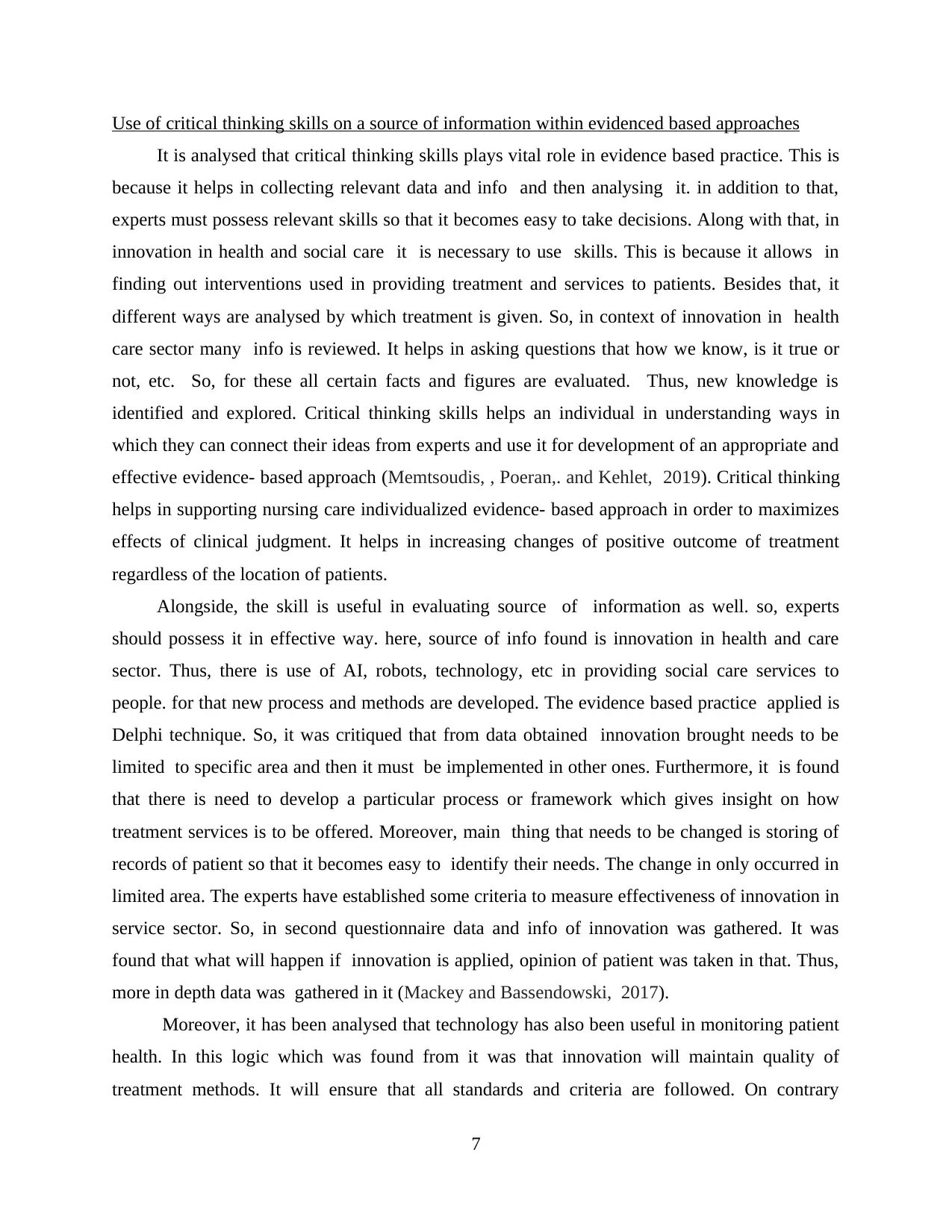
Use of critical thinking skills on a source of information within evidenced based approaches
It is analysed that critical thinking skills plays vital role in evidence based practice. This is
because it helps in collecting relevant data and info and then analysing it. in addition to that,
experts must possess relevant skills so that it becomes easy to take decisions. Along with that, in
innovation in health and social care it is necessary to use skills. This is because it allows in
finding out interventions used in providing treatment and services to patients. Besides that, it
different ways are analysed by which treatment is given. So, in context of innovation in health
care sector many info is reviewed. It helps in asking questions that how we know, is it true or
not, etc. So, for these all certain facts and figures are evaluated. Thus, new knowledge is
identified and explored. Critical thinking skills helps an individual in understanding ways in
which they can connect their ideas from experts and use it for development of an appropriate and
effective evidence- based approach (Memtsoudis, , Poeran,. and Kehlet, 2019). Critical thinking
helps in supporting nursing care individualized evidence- based approach in order to maximizes
effects of clinical judgment. It helps in increasing changes of positive outcome of treatment
regardless of the location of patients.
Alongside, the skill is useful in evaluating source of information as well. so, experts
should possess it in effective way. here, source of info found is innovation in health and care
sector. Thus, there is use of AI, robots, technology, etc in providing social care services to
people. for that new process and methods are developed. The evidence based practice applied is
Delphi technique. So, it was critiqued that from data obtained innovation brought needs to be
limited to specific area and then it must be implemented in other ones. Furthermore, it is found
that there is need to develop a particular process or framework which gives insight on how
treatment services is to be offered. Moreover, main thing that needs to be changed is storing of
records of patient so that it becomes easy to identify their needs. The change in only occurred in
limited area. The experts have established some criteria to measure effectiveness of innovation in
service sector. So, in second questionnaire data and info of innovation was gathered. It was
found that what will happen if innovation is applied, opinion of patient was taken in that. Thus,
more in depth data was gathered in it (Mackey and Bassendowski, 2017).
Moreover, it has been analysed that technology has also been useful in monitoring patient
health. In this logic which was found from it was that innovation will maintain quality of
treatment methods. It will ensure that all standards and criteria are followed. On contrary
7
It is analysed that critical thinking skills plays vital role in evidence based practice. This is
because it helps in collecting relevant data and info and then analysing it. in addition to that,
experts must possess relevant skills so that it becomes easy to take decisions. Along with that, in
innovation in health and social care it is necessary to use skills. This is because it allows in
finding out interventions used in providing treatment and services to patients. Besides that, it
different ways are analysed by which treatment is given. So, in context of innovation in health
care sector many info is reviewed. It helps in asking questions that how we know, is it true or
not, etc. So, for these all certain facts and figures are evaluated. Thus, new knowledge is
identified and explored. Critical thinking skills helps an individual in understanding ways in
which they can connect their ideas from experts and use it for development of an appropriate and
effective evidence- based approach (Memtsoudis, , Poeran,. and Kehlet, 2019). Critical thinking
helps in supporting nursing care individualized evidence- based approach in order to maximizes
effects of clinical judgment. It helps in increasing changes of positive outcome of treatment
regardless of the location of patients.
Alongside, the skill is useful in evaluating source of information as well. so, experts
should possess it in effective way. here, source of info found is innovation in health and care
sector. Thus, there is use of AI, robots, technology, etc in providing social care services to
people. for that new process and methods are developed. The evidence based practice applied is
Delphi technique. So, it was critiqued that from data obtained innovation brought needs to be
limited to specific area and then it must be implemented in other ones. Furthermore, it is found
that there is need to develop a particular process or framework which gives insight on how
treatment services is to be offered. Moreover, main thing that needs to be changed is storing of
records of patient so that it becomes easy to identify their needs. The change in only occurred in
limited area. The experts have established some criteria to measure effectiveness of innovation in
service sector. So, in second questionnaire data and info of innovation was gathered. It was
found that what will happen if innovation is applied, opinion of patient was taken in that. Thus,
more in depth data was gathered in it (Mackey and Bassendowski, 2017).
Moreover, it has been analysed that technology has also been useful in monitoring patient
health. In this logic which was found from it was that innovation will maintain quality of
treatment methods. It will ensure that all standards and criteria are followed. On contrary
7
Paraphrase This Document
Need a fresh take? Get an instant paraphrase of this document with our AI Paraphraser
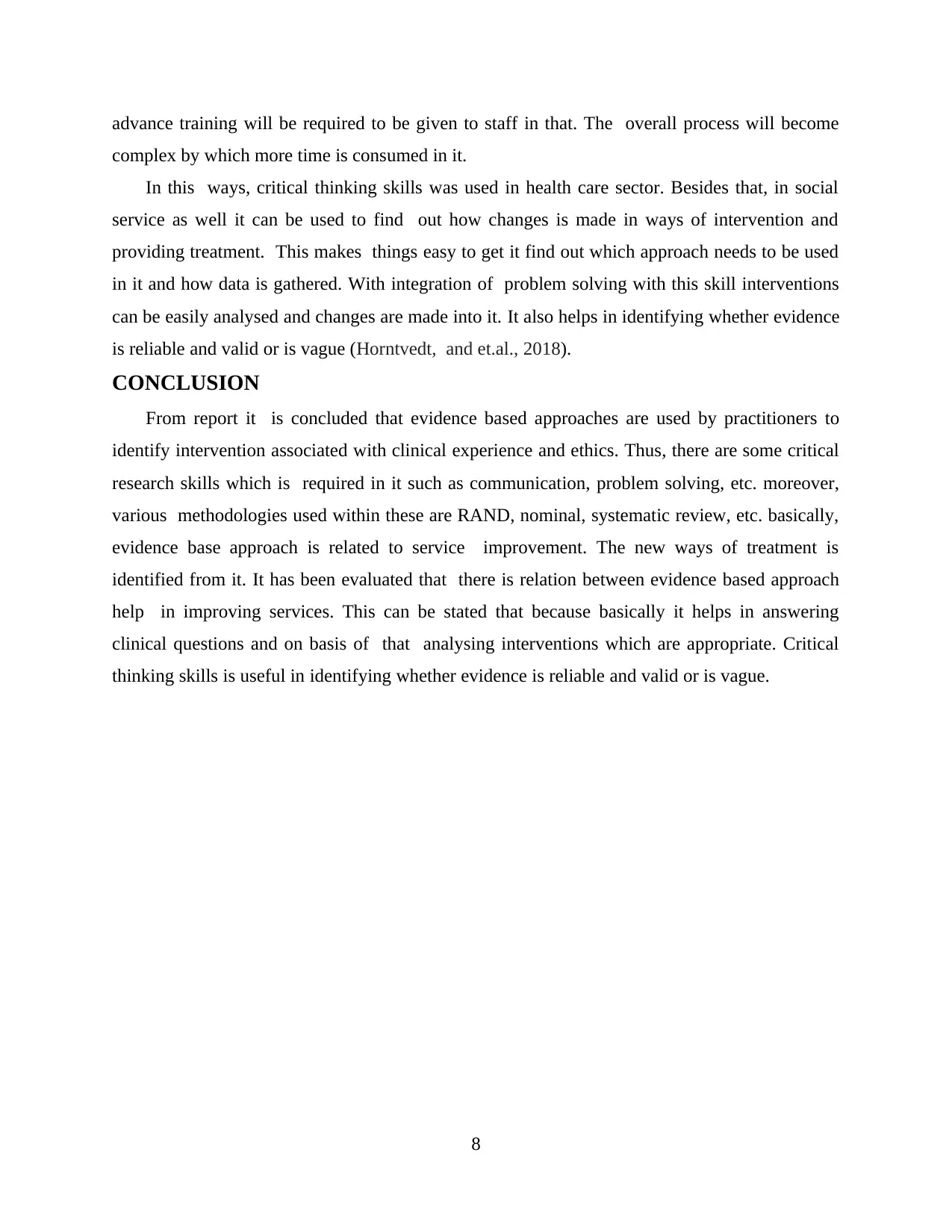
advance training will be required to be given to staff in that. The overall process will become
complex by which more time is consumed in it.
In this ways, critical thinking skills was used in health care sector. Besides that, in social
service as well it can be used to find out how changes is made in ways of intervention and
providing treatment. This makes things easy to get it find out which approach needs to be used
in it and how data is gathered. With integration of problem solving with this skill interventions
can be easily analysed and changes are made into it. It also helps in identifying whether evidence
is reliable and valid or is vague (Horntvedt, and et.al., 2018).
CONCLUSION
From report it is concluded that evidence based approaches are used by practitioners to
identify intervention associated with clinical experience and ethics. Thus, there are some critical
research skills which is required in it such as communication, problem solving, etc. moreover,
various methodologies used within these are RAND, nominal, systematic review, etc. basically,
evidence base approach is related to service improvement. The new ways of treatment is
identified from it. It has been evaluated that there is relation between evidence based approach
help in improving services. This can be stated that because basically it helps in answering
clinical questions and on basis of that analysing interventions which are appropriate. Critical
thinking skills is useful in identifying whether evidence is reliable and valid or is vague.
8
complex by which more time is consumed in it.
In this ways, critical thinking skills was used in health care sector. Besides that, in social
service as well it can be used to find out how changes is made in ways of intervention and
providing treatment. This makes things easy to get it find out which approach needs to be used
in it and how data is gathered. With integration of problem solving with this skill interventions
can be easily analysed and changes are made into it. It also helps in identifying whether evidence
is reliable and valid or is vague (Horntvedt, and et.al., 2018).
CONCLUSION
From report it is concluded that evidence based approaches are used by practitioners to
identify intervention associated with clinical experience and ethics. Thus, there are some critical
research skills which is required in it such as communication, problem solving, etc. moreover,
various methodologies used within these are RAND, nominal, systematic review, etc. basically,
evidence base approach is related to service improvement. The new ways of treatment is
identified from it. It has been evaluated that there is relation between evidence based approach
help in improving services. This can be stated that because basically it helps in answering
clinical questions and on basis of that analysing interventions which are appropriate. Critical
thinking skills is useful in identifying whether evidence is reliable and valid or is vague.
8
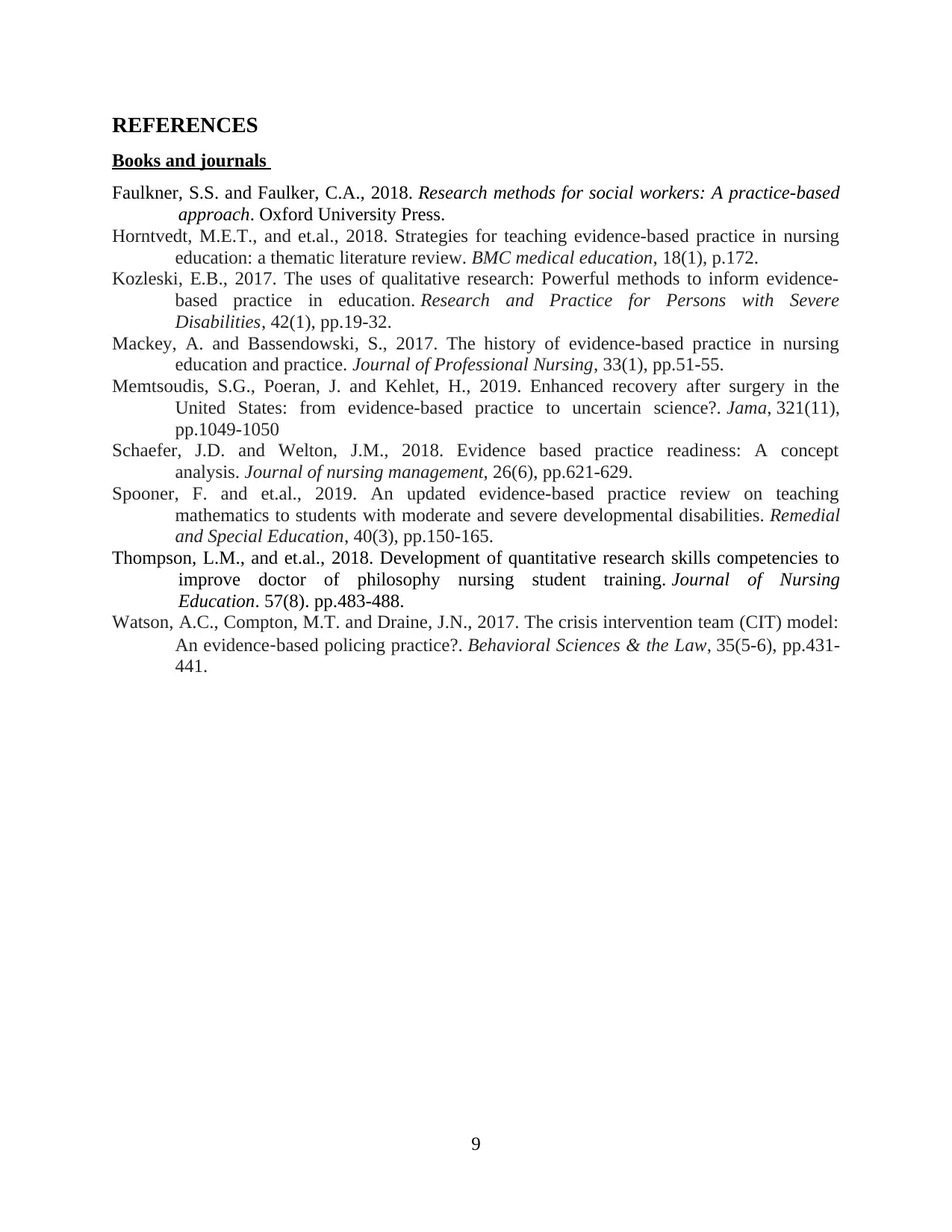
REFERENCES
Books and journals
Faulkner, S.S. and Faulker, C.A., 2018. Research methods for social workers: A practice-based
approach. Oxford University Press.
Horntvedt, M.E.T., and et.al., 2018. Strategies for teaching evidence-based practice in nursing
education: a thematic literature review. BMC medical education, 18(1), p.172.
Kozleski, E.B., 2017. The uses of qualitative research: Powerful methods to inform evidence-
based practice in education. Research and Practice for Persons with Severe
Disabilities, 42(1), pp.19-32.
Mackey, A. and Bassendowski, S., 2017. The history of evidence-based practice in nursing
education and practice. Journal of Professional Nursing, 33(1), pp.51-55.
Memtsoudis, S.G., Poeran, J. and Kehlet, H., 2019. Enhanced recovery after surgery in the
United States: from evidence-based practice to uncertain science?. Jama, 321(11),
pp.1049-1050
Schaefer, J.D. and Welton, J.M., 2018. Evidence based practice readiness: A concept
analysis. Journal of nursing management, 26(6), pp.621-629.
Spooner, F. and et.al., 2019. An updated evidence-based practice review on teaching
mathematics to students with moderate and severe developmental disabilities. Remedial
and Special Education, 40(3), pp.150-165.
Thompson, L.M., and et.al., 2018. Development of quantitative research skills competencies to
improve doctor of philosophy nursing student training. Journal of Nursing
Education. 57(8). pp.483-488.
Watson, A.C., Compton, M.T. and Draine, J.N., 2017. The crisis intervention team (CIT) model:
An evidence‐based policing practice?. Behavioral Sciences & the Law, 35(5-6), pp.431-
441.
9
Books and journals
Faulkner, S.S. and Faulker, C.A., 2018. Research methods for social workers: A practice-based
approach. Oxford University Press.
Horntvedt, M.E.T., and et.al., 2018. Strategies for teaching evidence-based practice in nursing
education: a thematic literature review. BMC medical education, 18(1), p.172.
Kozleski, E.B., 2017. The uses of qualitative research: Powerful methods to inform evidence-
based practice in education. Research and Practice for Persons with Severe
Disabilities, 42(1), pp.19-32.
Mackey, A. and Bassendowski, S., 2017. The history of evidence-based practice in nursing
education and practice. Journal of Professional Nursing, 33(1), pp.51-55.
Memtsoudis, S.G., Poeran, J. and Kehlet, H., 2019. Enhanced recovery after surgery in the
United States: from evidence-based practice to uncertain science?. Jama, 321(11),
pp.1049-1050
Schaefer, J.D. and Welton, J.M., 2018. Evidence based practice readiness: A concept
analysis. Journal of nursing management, 26(6), pp.621-629.
Spooner, F. and et.al., 2019. An updated evidence-based practice review on teaching
mathematics to students with moderate and severe developmental disabilities. Remedial
and Special Education, 40(3), pp.150-165.
Thompson, L.M., and et.al., 2018. Development of quantitative research skills competencies to
improve doctor of philosophy nursing student training. Journal of Nursing
Education. 57(8). pp.483-488.
Watson, A.C., Compton, M.T. and Draine, J.N., 2017. The crisis intervention team (CIT) model:
An evidence‐based policing practice?. Behavioral Sciences & the Law, 35(5-6), pp.431-
441.
9
⊘ This is a preview!⊘
Do you want full access?
Subscribe today to unlock all pages.

Trusted by 1+ million students worldwide
1 out of 9
Related Documents
Your All-in-One AI-Powered Toolkit for Academic Success.
+13062052269
info@desklib.com
Available 24*7 on WhatsApp / Email
![[object Object]](/_next/static/media/star-bottom.7253800d.svg)
Unlock your academic potential
Copyright © 2020–2026 A2Z Services. All Rights Reserved. Developed and managed by ZUCOL.





